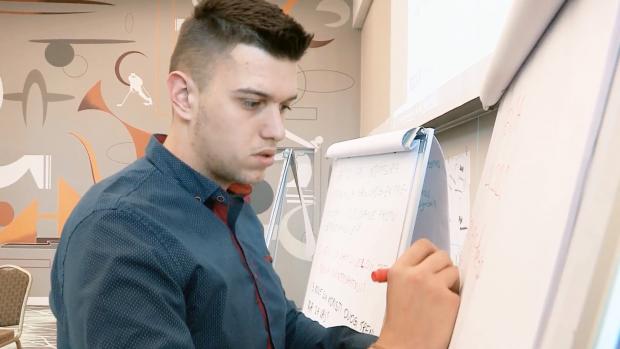“Tolerance is crucial for success” — Building the capacity of youth leaders to prevent violent extremism and radicalization in Bosnia and Herzegovina
Fourteen youth gather around a circle of chairs as the discussion is bubbling. It is the third day of the “Leaders Against Intolerance and Violent Extremism” training, also known as LIVE, in Bosnia and Herzegovina. The training, organized by the OSCE Mission to Bosnia and Herzegovina in cooperation with the Action against Terrorism Unit of the OSCE Transnational Threats Department, aims at inspiring and empowering young people to make full use of their capacities to build resilience to intolerance and violent extremism and to make a positive difference in their communities.
These youth leaders engage with local communities through a variety of areas of work. Peace-building, ecology, humanitarian aid and migration, are some areas where these leaders are committed to raising awareness to the dangers of violent extremism and radicalization among their peers.
Ena Jusufbegović, participant of the LIVE training, expresses the impact youth can have on their communities: “Young people must be aware of the dangers of radicalized behavior and all the things it can lead to. We must be aware of the consequences and act early on in our communities to prevent this from happening. Young people are best equipped to do this, since they can influence their peers, work with them and introduce them to these issues, and raise awareness towards peace, understanding, tolerance and all other things leading to a better, more beautiful future.”
Indeed, youth should, and can be, in the forefront in the prevention of violent extremism and radicalization. They can be powerful agents of change and advocates of peace, tolerance and mutual understanding. Yet, young people, representing a variety of backgrounds and identities, are often considered more vulnerable to violent extremism recruitment.
Sead Turčalo, Assistant Professor and Dean at the University of Sarajevo’s Faculty of Political Science, and invited speaker of the LIVE training, notes that young people are perceived to be more at risk of radicalization than any other age group:
“The young population, especially those of adolescent age, are looking for new challenges, seeking answers to questions. They belong to a more vulnerable group of the population. It is thus important to discuss this and build mechanisms, responses and resilience within this group for the mere fact that they are the most exposed to different kinds of influences and are usually targeted by various groups.”
Following the LIVE training in Bosnia and Herzegovina, these young leaders are now equipped to raise awareness on preventing and countering violent extremism, building resilience to it locally at a grassroots level.
As a result of the programme, they have strengthened access to other youth from across the country and in their local communities by becoming part of the network of young people involved in preventing violent extremism activities.
Application of human rights and a do no harm-based approach in educational initiatives aimed at young people is essential. Particular emphasis should be put on teaching human rights, promoting tolerance and on building key skills — such as critical thinking, counter-narratives and peace-building communication.
As Amina Kahriman, a participant of the LIVE –training puts it: “Tolerance is crucial for success.”
Watch the video "Voices of civil society building bridges" and learn more about the young leaders’ experience in the LIVE training:
The LIVE Initiative by the OSCE Action Against Terrorism Unit seeks to promote context-specific efforts against violent extremism across the OSCE area developed and led by civil society at the grassroots level. Through three training courses tailored for youth, women and community leaders, the LIVE programme aims at building the capacity of civil society to effectively and safely develop and mobilize others to undertake work on preventing violent extremism in human rights compliant ways.


